Assassin's Creed Odyssey hands-on: RPG-style choices bring the game's story to life
We've spent a few hours with the just-announced Ancient Greece-set entry.
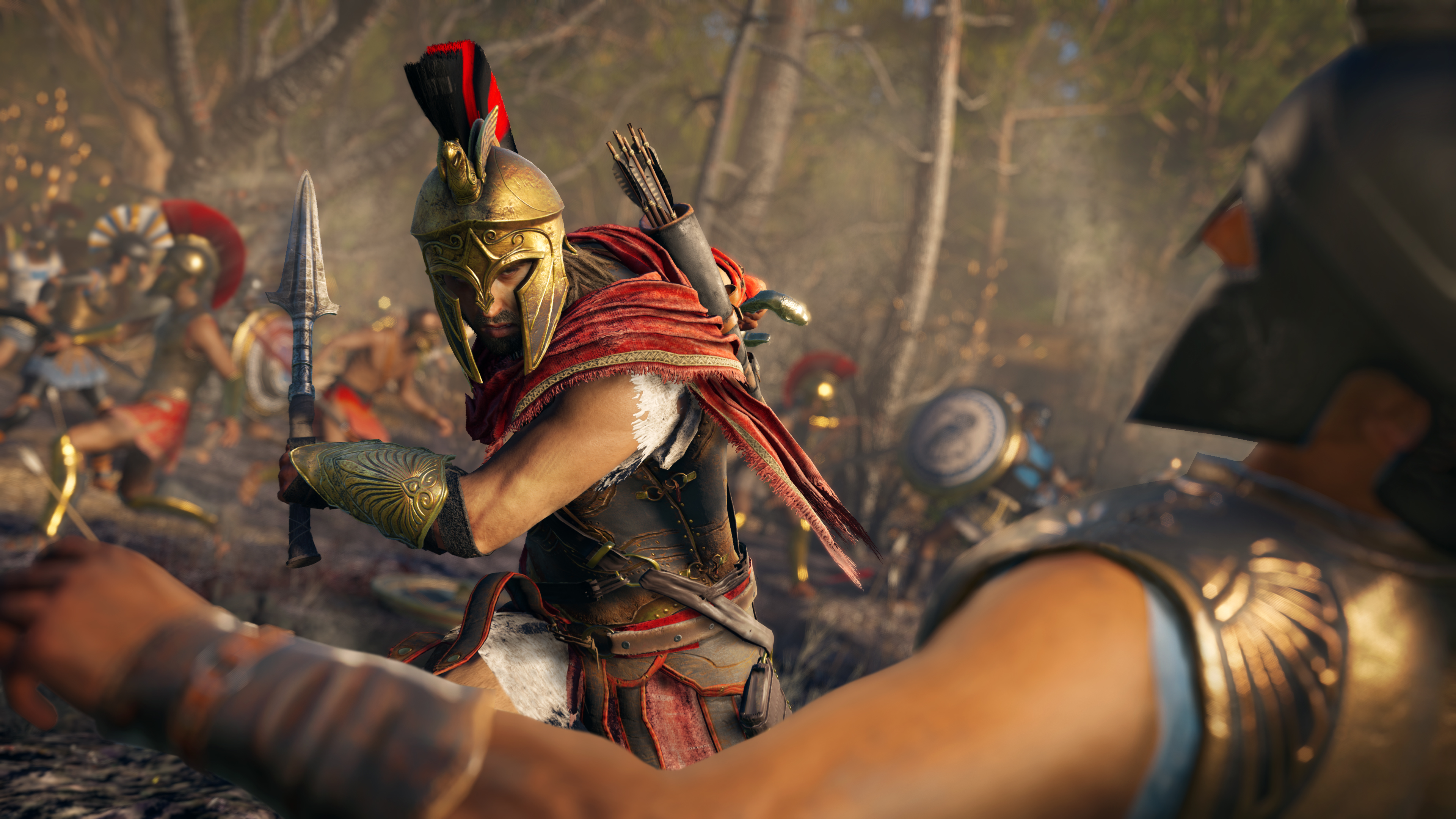
I just killed a bear on a beach. It took me a few attempts—mostly because I find dodging animals attacks fraught in Assassin's Creed Odyssey, much like I did in Origins—but I finally shot the thing with enough fire arrows that it went down. While I normally wouldn't expect a game to justify the logic of a boss battle with a bear, an investigation of a nearby shipwreck, strewn with bodies, reveals the reason why it's there. The bear was being transported by shady smugglers, until the boat crashed.
The character who sent me to kill the bear was a smuggler too—something she didn't tell me at the start of the quest. Confronting her, I choose to blackmail her with what I've discovered about her illegal activities. Rather than pay up, she angrily draws her sword, and I cut her down her pretty quickly. If I'd responded with "this stays between us" rather than "this stays between us...for a price", the quest would've ended with no fight, and this NPC would still be alive.
Dialogue choices and consequences are well-worn territory for RPGs, but it's new to Assassin's Creed, and it's a great fit based on my several hours with the game's E3 demo. The setting is Ancient Greece in 431, during the Peloponnesian War between Sparta and Athens. Ubisoft highlights it as a founding period for art, science and politics. This demo is more specifically set on the two islands of Delos and Mykonos, a self-contained episode away from the game's larger world. During my hands-on, I gift wine to a character I want to romance. I get to choose whether to pick a head-on military strategy or a more careful one. I choose to be a dick to everyone I can, just to provoke heated responses. As a result of these actions, characters can live or die. It's an exciting wrinkle that makes me more engaged with the goings on in an Assassin's Creed cutscene than I usually am.
Greek tragedy
That idea of choice even extends to which character you take the journey with in Odyssey. You've got male and female protagonists—Alexios, who's unmistakably voiced by Elias Toufexis of Adam Jensen fame, and Kassandra, who I choose to play as in this demo.
You're the descendant of the Spartan king Leonidas, and you carry his spear as a secondary weapon in Odyssey. Both Alexios and Kassandra's stories play out similarly. It's described by Ubisoft as an epic Greek tragedy—the hero's family is shattered, they're thrown off a mountain and left for dead, and the story then picks up seventeen years later.
"When we look at the game, there's short term, medium term and long term goals," creative director Jonathan Dumont tells me when I ask how granular the game's choices are. "The long term can pan out over, I don't know, 70 hours—'oh, that was the result of that, holy crap!'. And what you've played in the E3 demo, was much more medium term. If you get to the ending of the island, that's medium term. And then short term is, someone will ask you, 'I want you to deal with this guy'. Do you kill him? Do you talk to him? Do you beat him up? You'll get some of these options. And then when you come back, that'll have a repercussion on your reward and your relationship with that character.
"I'll give you an example: we have a quest where you're asked to find a weapon. Someone asks, 'can you find my sword?' You find the sword, and you can come back, lie and keep it for yourself. These are choices that have an immediate impact. And then there's an accumulation of things that you can build up towards—bigger things. There are definite major choices in the game, which I won't spoil, but that really spin the story in a different direction."
The biggest gaming news, reviews and hardware deals
Keep up to date with the most important stories and the best deals, as picked by the PC Gamer team.
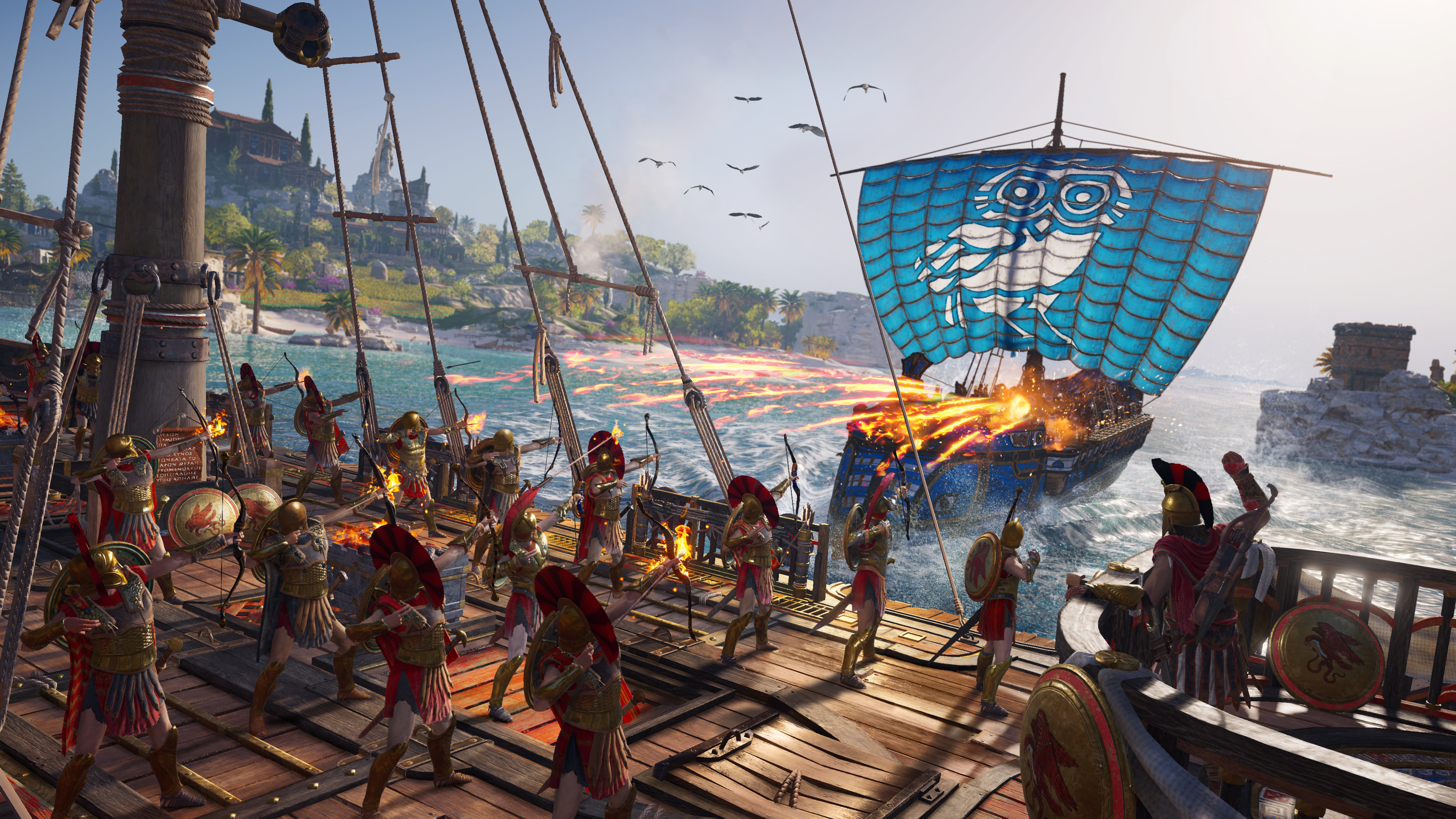
Despite having Spartan roots, you're playing a mercenary in the game, and you'll make choices that shape the war in favour of Sparta and Athens, and who gets to control areas of the map. Exactly how this works isn't made particularly clear by my demo. The goal is to remove the Athenians and their leader, Podarkes the Cruel, so the Spartans, led by a soldier called Thaletas and a resistance leader called Kyra, can muscle in. I spend most of the demo reducing a bar that represented the Athenians' control by murdering their soldiers and clearing out occupied areas—there's no option to switch sides, for example. It feels like the Athenians are meant to be the bad guys in the demo, so I ask creative director Jonathan Dumont how much this represents the full game's conflict between them.
"For this specific mission and island, yes, but the Athenians aren't always going to be bad, or anything like that. You'll do the opposite in the game, too—you'll help Athenians fight Spartans. They're hiring you as a mercenary. Sometimes it's going to be an Athenian who hires you, sometimes a Spartan. [You're] not fighting on the Spartan side, even though [you] have more of a history with Sparta. As you're exploring the world with your character, you'll be in all sorts of situations. If you go into a region that is owned by Sparta, for example, you can do contracts to take it away from Sparta and put the Athenians there based on the rewards you want. So that's how it works. It's not good guys are Spartans, bad guys are Athenians, it's much more complex than that."
The Athenians are marked as blue and the Spartans as red on the map—at one point I see their ships battling in the waters surrounding the islands, which is a surprising and cool dynamic event. I hope there's a lot more like that in the finished game, since it sells the sense of a war going on around your character.
With a promised 30 hours of 'interactive storytelling', I ask Dumont how much this tale will branch. "You have some big choices that will influence what's coming next, and the ending you can get down the road. Without promising millions of endings—that's not the case at all—we are catering to your choices and how you play it."
Love island
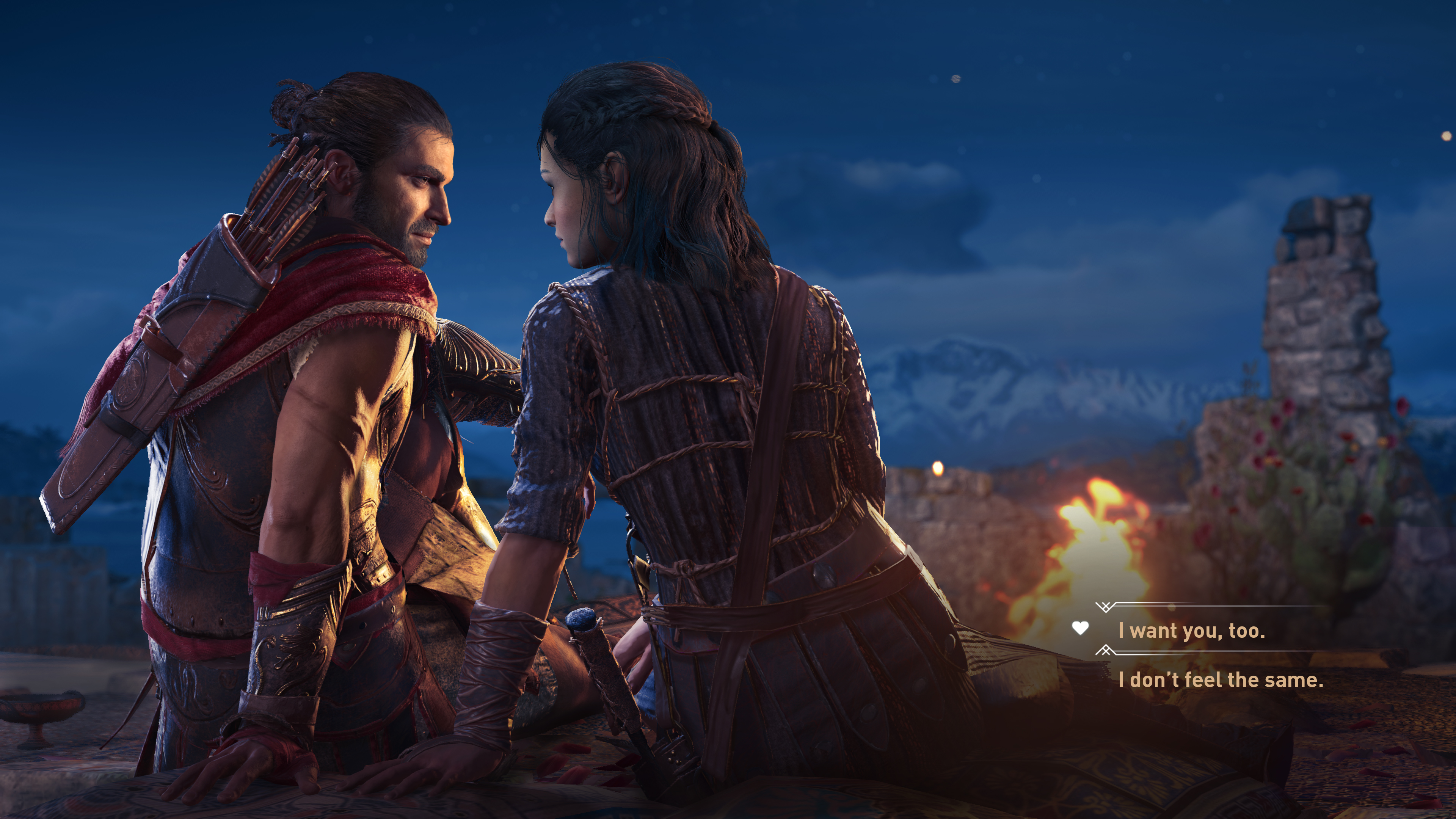
In the demo, it's possible to romance both Thaletas and Kyra. I pick up some wine at one point while exploring, and when I next chat to Kyra, an extra dialogue options comes up with a heart next to it if I want to gift it to her. Romances are dalliances in Odyssey—it's not like you can go full Fable and have three husbands. "You go from an island or a new place in the world, and you'll romance a character there, but it's not like 'I found the love of my world and I'm keeping that character'," says Dumont. "It's much more casual, a spur-of-the-moment type of romance."
Kyra is probably the most interesting supporting character in the demo—she's been fighting Podarkes and his forces on Delos for some time, and hangs out in an underground hideout with the rest of her allies. I don't want to spoil what happens during this quest in case you want to see it yourself, but eventually you do clear out Podarkes' forces, which is kind of obvious. I killed him at a point that actually cut off several other missions of the game, partly because I took him on several levels above where I was supposed to. The quest line then ends in a party, where Kyra and Thaletas attend.
What you say to them at this point can apparently determine which of them lives and dies, and there are even what's described to me as 'wild card' scenarios, where a seemingly unrelated decision of the player's affects the outcome. That happened during my demo. I saved a prisoner, and it had deadly consequences later on. And in the aftermath, I had to decide whether the prisoner lived or died. These actually feel like interesting choices.
Spear tactics
Ubisoft Quebec seems committed to letting you make decisions at key moments, then, but it's not Odyssey's only headline feature. To play, it feels a lot like a direct sequel to Origins: the platforming is the same, the environment's layout is pretty similar and you still use an eagle to scout the environment for enemies and objectives. The combat has undergone the most change, though. You have no shield this time, meaning you can't really block in the same way you could with Origins. Since you're carrying Leonidas's spear instead, you can only parry when you're carrying a one-handed weapon. The window for parrying isn't long, too, so you feel a bit exposed.
To compensate, you're given more aggressive combat abilities. You have to map these yourself—on an Xbox controller, you hold down LB and LT and press the face buttons to activate your chosen ability (I can't speak for mouse and keyboard, since the demo was running on an Xbox). These abilities are divided up by hunter (bow), warrior (melee) and assassin (stealth). You can only map four ranged abilities and four melee abilities at a time, so there's an element of mix-and-match depending on the enemy.
Spartan kick is the one you can't miss—it's great fun to boot an enemy off the edge of a cliff in stealth. Another sets a weapon on fire for extra damage, then another grants 25% of the character's health back. There's one that lets you throw the spear to instantly kill an enemy while in stealth, and an essential move that can instantly disarm an enemy's shield when upgraded. Each one costs a certain portion of your character's adrenaline bar to use in a fight.
They're unlocked via a grid not to dissimilar to the one in Origins, except abilities can be upgraded two more times for extra effects. Some of Alexios or Kassandra's basic abilities can be upgraded, too: if you jump from a precariously high spot, you can hold down A not to take any damage upon landing with the right ability upgraded. You can later level this up so your character stun enemies when they land.
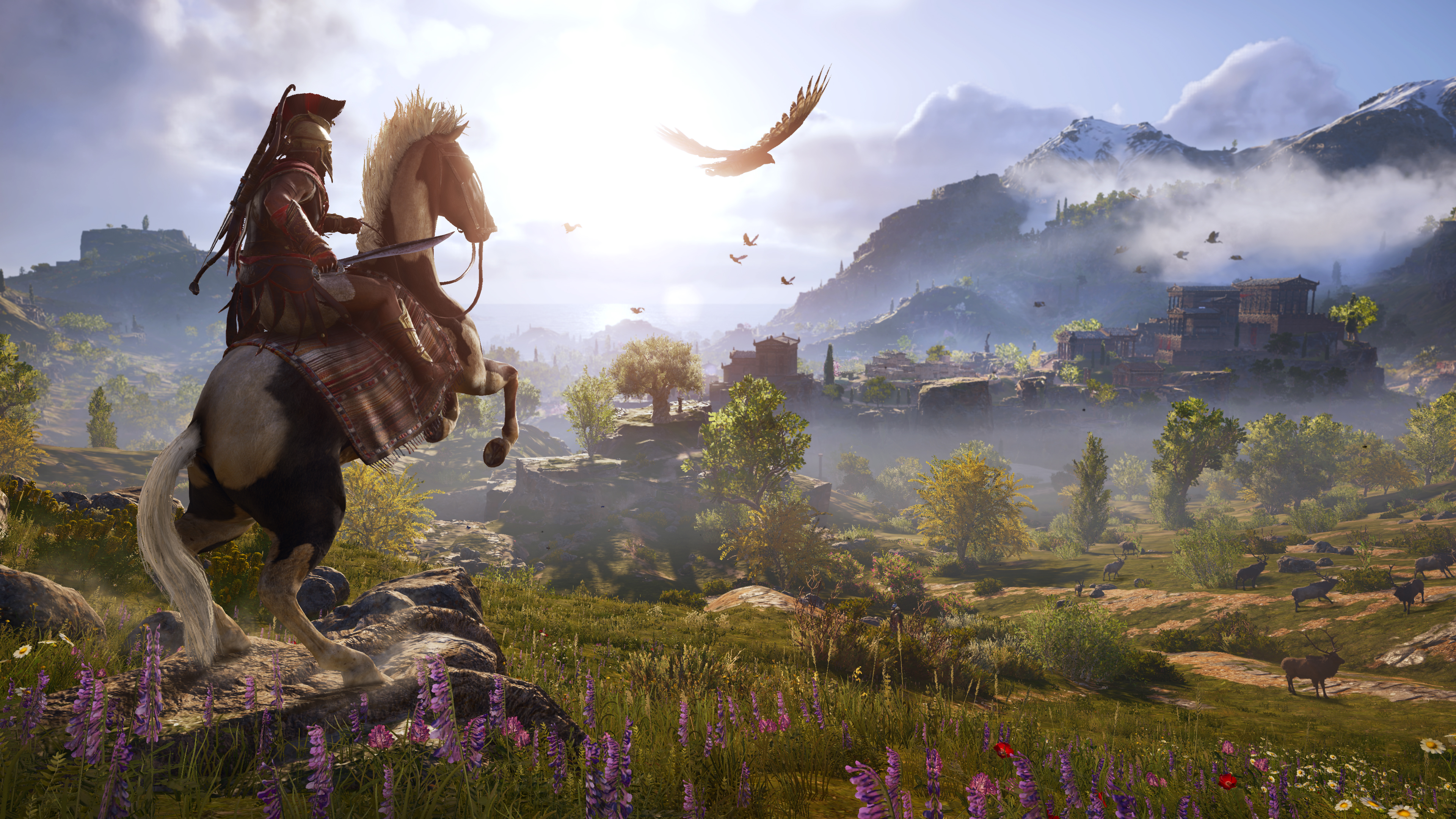
The intention of having no shield but extra powers is to create a more aggressive fighting system, one that reflects the style of combat in its setting. "We wanted an agile character," Dumont says. "We didn't want to be a defensive character, but to be much more of a powerhouse character that comes into the fight—a bit more Spartan spirit. The shield thing was something we discussed quite a bit, but in the end, we felt that the offensive abilities that we added that you can map to the game was giving us a good tempo in fighting. Once you get accustomed to it, you're actually balancing crowd control with the abilities."
I die a lot at the start of the demo without the shield—I'm pretty used to fighting that way in Origins, but those partial to dual swords might pick the rhythm up faster. The window to parry is pretty tight, and Dumont says Ubisoft Quebec wants to make it easier based on the comments they've been getting. After I have a strong coffee to quash my jet lag, though, I get the hang of it. The game's adrenaline bar charges very quickly during a battle, so the intention is you're always meant to be using these abilities to keep crowds under control.
Even if Origins marked a big improvement on Assassin's Creed's old combat, I found it a little clunky and too beholden to level numbers, and I still feel that way playing Odyssey. By the end of the demo, I'm spamming the same moves over and over again to win fights—this is how I beat Podarkes, by setting my sword on fire and repeating a heavy attack move until he dies. That said, I like that different scenarios challenge me to use the new abilities based on the situation. There's little point in using a shield break on a bear, for example, but firing a super powerful arrow or restoring a chunk of Kassandra's health helped me win that battle after a few failed attempts.
You'll also be able to participate in giant 150 vs 150 battles between the two sides, and the screen will be absolutely filled with units. My one encounter like this was pretty simple, though: I just killed captains to make the Athenian army's health bar go down, then defeated a hero character when he turned up. It was a pretty rote set of fights, even if the scale of the conflict is impressive.
'Epic legs'
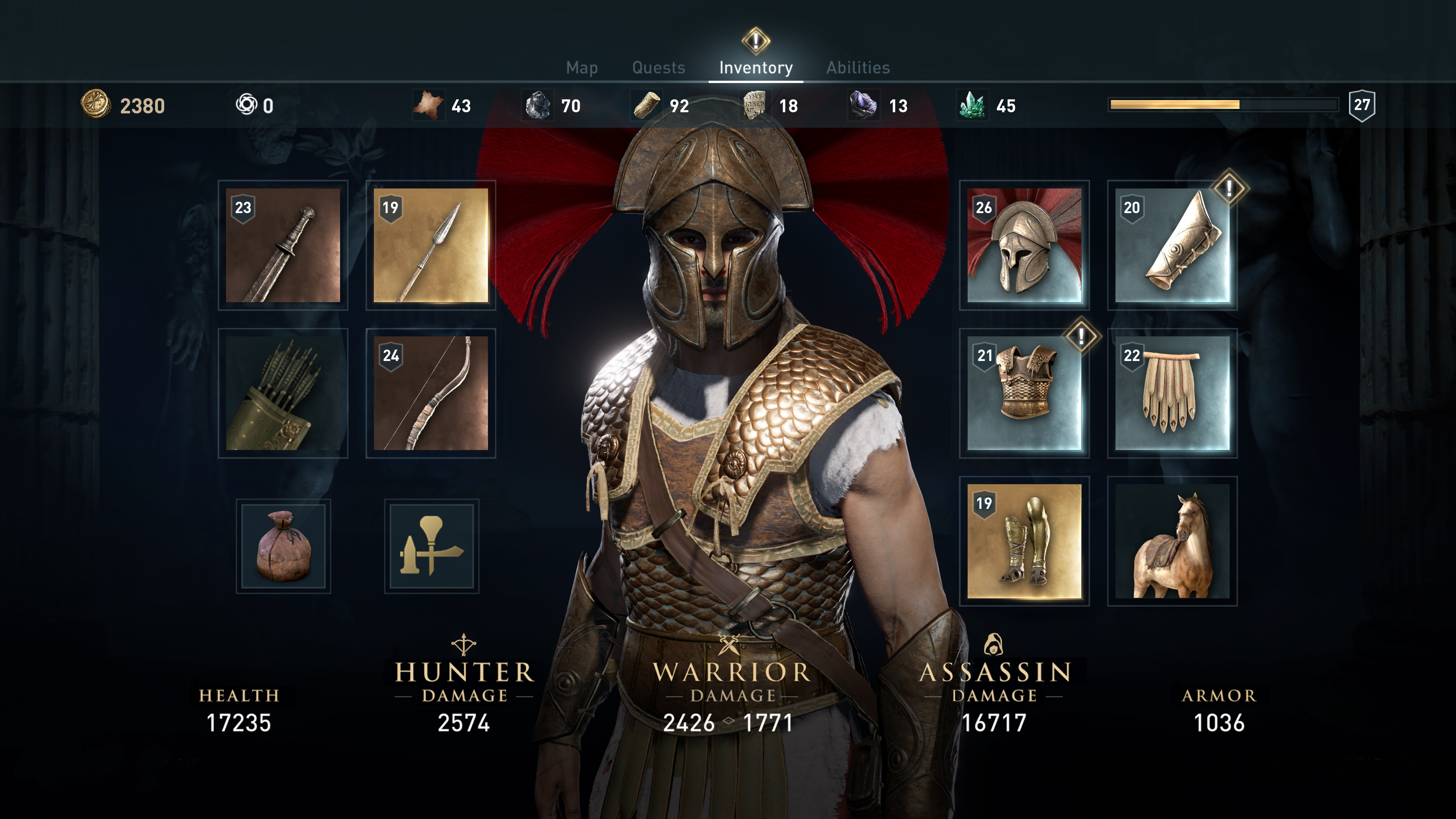
Ubisoft is calling Odyssey a full RPG—the Assassin's Creed version of that, anyway. Alongside narrative choices, 'RPG' means more numbers. Ubisoft Quebec has extended the stats and perks system of weapons in the last game to armour, so you're constantly changing up individual pieces for rarer ones. Helping Sparta overcome the Athenians rewards Kassandra with a rad-looking goldplated Spartan breastplate. At one point I get a piece of leg armour that the game calls 'epic legs', which I find amusing.
If you enjoyed stealing loot in Origins, you can't do that as openly this time. A bounty system exists in Odyssey, and if you steal loot marked with red and get caught doing so by an NPC, it's possible they'll put a price on your head. Mercenaries will then come after you, in what seems like a similar system to the Thylakes in Origins, although you can pay off bounties in the menu screen if you're worried about it.
As with Egypt, I expect to be dazzled by the world of Odyssey. These two islands look gorgeous, with clean white architecture, lots of ornate surfaces and huge statues to climb. Ubisoft promises everything from snowy peaks to deserts across its version of Ancient Greece. On the in-game map, locations include Attika, Euboea, Arkadia, Lakonia and Lesbos, and you'll be able to navigate its many islands with a ship, as naval combat once again returns to the series. If you enjoyed battling Egyptian gods last time, I'm pretty convinced Greek mythology will form the basis of some superbosses. "For now, let's keep it for later, but it's Ancient Greece, so we'll see," smiles Dumont when I ask about the possibility.
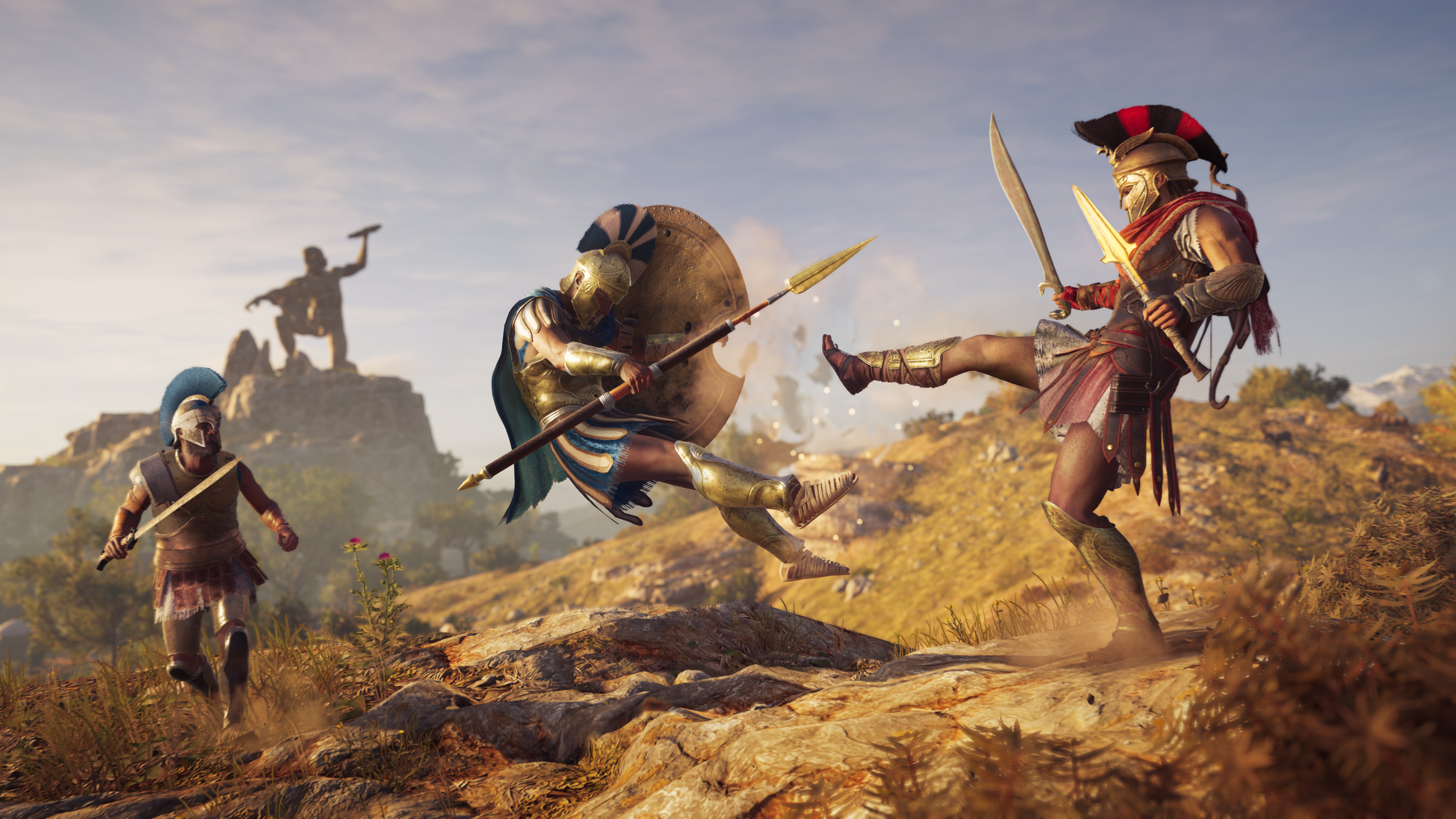
Origins was the strongest Assassin's Creed in years for me, and I see plenty here that reminds me why: decent quest design, which nicely paces out the series' icon-heavy filler, and a gorgeous world that's fun to explore. Giving you narrative choices is potentially the biggest change to the series in years—at the very least, it could make me emotionally invested in an Assassin's Creed story in a way that I haven't been before.


